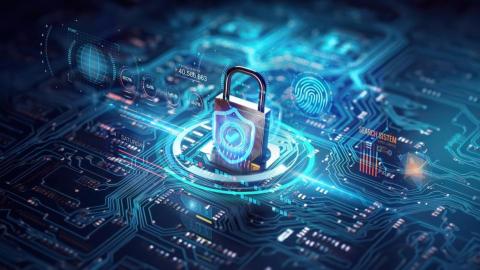Ethical Hacking
Learn to Protect What Matters Most
Cybersecurity threats are rising—and so is the need for skilled professionals who can stop them. This hands-on Ethical Hacking course teaches you how to think like a hacker to defend businesses, organizations, and communities from cyber attacks.
You'll explore real-world hacking techniques and cybersecurity best practices in a safe, legal, and ethical environment. Learn how to identify vulnerabilities, test defenses, and protect sensitive data—giving you the skills companies are urgently hiring for.
Whether you’re starting a tech career or expanding your IT skills, this course helps you build practical, in-demand knowledge for roles in cybersecurity, IT security, and tech support.
Course Description
The Ethical Hacker course prepares learners with skills to proactively discover vulnerabilities before the cybercriminals do. Learners will become proficient in the art of scoping, executing, and reporting on vulnerability assessments, while recommending mitigation strategies.
What is Ethical Hacking?
Ethical hacking is the use of hacking techniques by friendly parties in an attempt to uncover, understand and fix security vulnerabilities in a network or computer system.
Ethical hackers have the same skills and use the same tools and tactics as malicious hackers, but their goal is always to improve network security without harming the network or its users.
In many ways, ethical hacking is like a rehearsal for real-world cyberattacks. Organizations hire ethical hackers to launch simulated attacks on their computer networks. During these attacks, the ethical hackers demonstrate how actual cybercriminals break into a network and the damage they could do once inside.
The organization’s security analysts can use this information to eliminate vulnerabilities, strengthen security systems and protect sensitive data.
The terms "ethical hacking" and "penetration testing" are sometimes used interchangeably. However, penetration tests are only one of the methods that ethical hackers use. Ethical hackers can also conduct vulnerability assessments, malware analysis and other information security services.
Benefits of Ethical Hacking
While there are many ways to assess cybersecurity, ethical hacking can help companies understand network vulnerabilities from an attacker's perspective. By hacking networks with permission, ethical hackers can show how malicious hackers exploit various vulnerabilities and help the company discover and close the most critical ones.
An ethical hacker's perspective may also turn up things that internal security analysts might miss. For example, ethical hackers go toe-to-toe with firewalls, cryptography algorithms, intrusion detection systems (IDSs), extended detection systems (XDRs) and other countermeasures. As a result, they know exactly how these defenses work in practice—and where they fall short—without the company suffering an actual data breach.
Learning Outcomes
Through the gamified narrative in the course and real-world inspired hands-on practice labs, students develop essential workforce readiness skills, laying a solid foundation in offensive security.
- Get job-ready for Offensive Security roles such as Ethical Hacker or Penetration Tester.
- Understand the mindset and tactics of cybercriminals to strengthen your defensive security skillset.
- Gain needed skills for implementing security controls and monitoring, analyzing, and responding to current security threats.
Why This Course Isn’t the Same as Cisco’s Free Online Version
Taking an instructor-led Ethical Hacking course is a completely different experience from completing Cisco’s free self-paced materials. While the online version is helpful for self-motivated learners, our program provides the structure, expert guidance, and real-world training needed to actually build job-ready cybersecurity skills.
What makes our course different:
- Live expert instruction: Ask questions in real time and get accurate, actionable answers—no guessing or searching online.
- Hands-on lab support: The instructor guides you through every lab, helping you overcome challenges and understand the purpose, skills gained, and real-world application.
- Industry insight: Learn best practices, tools, and day-to-day workflows from someone who has worked in SOC and penetration testing roles.
- Community & networking: Hear classmates’ questions, collaborate, and build connections that support your learning and career pathway.
- Structured learning: A set schedule keeps you accountable and ensures you complete the program with confidence.
- Certification preparation: Receive curated study tools, guidance, and resources designed to help you prepare for industry credentials.
Cisco’s free online content is self-guided. Our course gives you live instruction, real-world context, hands-on support, and a learning community—key elements for becoming a successful ethical hacker.
Schedule
Spring 2026:
March 2 - May 21, 2026 | Tuesdays & Thursdays | 5:30 - 9:00 pm
Total Instructional Hours: 77; Total Sessions: 22; ONLINE
Tuition
$900 + $25 registration fee
Total: $925*
*CCNY students, staff, and Alumni Association members receive a 10% discount.
Payment plan options are available to assist with tuition affordability.
Instructor
Arnold Ramsaran
Arnold holds a Master of Science degree in Cyber Security and Cyber Terrorism, he is a Systems Engineer for Cisco Systems, starting in 2013 he was a Network Engineer for the National September 11th Memorial & Museum at Ground Zero, in his time there he helped to open the Museum (May 2014) by completing their wired and wireless IT infrastructure to host the President of the United States and subsequently the Pope. Arnold is also an ITQ Instructor for Cisco Networking Academy for Rensselaer Polytechnic Institute. As an ITQ Instructor he trains the U.S. Navy training officers on naval bases, other Cisco Academy instructors and legally blind students. Arnold also holds a Bachelor’s degree in Computer Science.
Spring 2026 Registration is Now Open.

Cybersecurity Fast Facts
Why Learn Ethical Hacking?
Global cybersecurity job openings in 2025
Average U.S. salary for certified ethical hackers
Frequency of cyber attacks worldwide
Of employers say cybersecurity is one of their top hiring priorities

Last Updated: 12/03/2025 09:34
